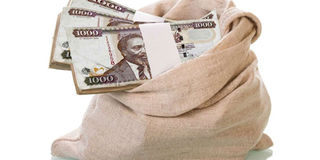New tax not the best way to pay for UHC

The government’s budgetary allocation towards health is just 2.2 per cent of gross domestic product (GDP). PHOTO| FOTOSEARCH
An efficient and equipped health system capable of providing universal access to good quality healthcare requires a functional financial system that protects all citizens from financial hardship arising from healthcare costs.
As it is, Kenya is yet to attain the requisite health financing threshold for universal health coverage (UHC). Strictly considering government funds from tax revenue only, the government’s budgetary allocation towards health is just 2.2 per cent of gross domestic product (GDP), yet countries that have made progress towards universal health coverage spend at least five per cent of GDP on health.
Further, the government’s contribution to health expenditure falls short of the Sh8,600 per person threshold required for universal health coverage, by Sh5,000. These shortfalls are filled by Kenyans digging deeper into their pockets to pay for healthcare, in what is called out-of-pocket spending.
Close to a third of Kenya’s total health expenditure is borne by households. This is way above the 15 to 20 per cent limit that indicates progress towards universal health coverage.
Kenya needs to consider prudent mechanisms for financing universal health coverage and it has chosen to go about this through the ‘Robin Hood’ tax announced by the Cabinet Secretary for Treasury in June; that is, a two per cent increase on excise duty on mobile money transfers and 0.05 per cent excise duty on bank transfers of Sh500,000 or more.
UNSUSTAINABLE
The Kenya Bankers Association (KBA) filed a suit to suspend the implementation of the latter because it wasn’t subject to public participation.
However, beyond the procedural concerns raised by KBA, the ‘Robin Hood’ tax proposal is flawed in more fundamental dimensions.
First, the government should collect taxes under the existing tax regime before introducing new taxes. Rather than introduce new taxes, resources to fund UHC should be sourced by increasing efficiency in revenue collection, particularly for corporate income tax (CIT), value added tax (VAT) and property tax.
These tax sources offer the best opportunities for substantial revenue improvements. Sectors such as agriculture and wholesale and retail trade, whose contribution of corporate income tax is disproportionately lower than their contribution to GDP present opportunities for enhanced revenue collection.
The Robin Hood tax proposal is at loggerheads with these facts since it aims to collect more taxes from sectors that are already contributing disproportionately higher taxes relative to their contribution to GDP.
Further, the ‘Robin Hood’ tax is not necessarily the most sustainable solution to finance universal health coverage. Calls for changes in the health system in order to achieve UHC, should be accompanied by equivalent focus on optimising governance and tax administration regimes put forward to finance UHC.
Economic analysis of the long-term effects of the new tax proposals is critical to ensure that while tax revenues are generated to support the noble UHC mission, the mechanisms of generating this tax revenue do not jeopardise the ease of doing business and the growth trajectories of key sectors of the economy.
If this is not done, the new tax proposals may slow down Kenya’s economy (and thus reduce overall growth in tax revenues), reduce Kenya’s competitiveness as an investment destination, and risk making the long-term sustainability of UHC not so sustainable after all.
Dr Rono is a health finance specialist and Managing Partner at E&K Consulting Firm. Ms Maoga is an actuarial scientist and business analyst at E&K Consulting Firm


